
archives for 12/2017
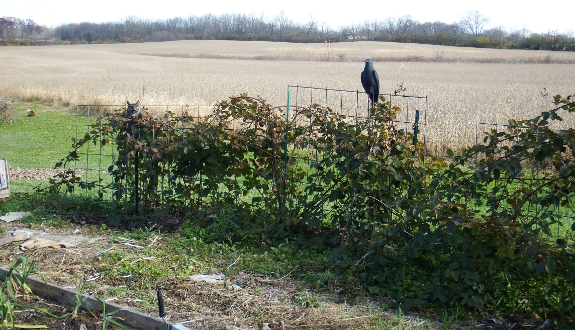
On our previous
homestead, I dove right into planting perennials as soon as we
purchased the property. This time, I'm trying to be a little more
thoughtful and talk to locals about what grows well on their nearby
patches of earth.
I'd assumed thornless
blackberries wouldn't be on the table. After all, the ones we grew in
Virginia tended to freeze back to the ground every other year, meaning
that they rarely bore fruit. Moving north, I doubted we'd manage
to keep this heat-loving bramble content.
I'm glad to say I was
wrong. Rose Nell and Jayne don't know what type of berry they were
given a year ago, but they report the bushes are big and the fruits
delicious. "Just plant them somewhere the blackberries can spread," my
mothers-in-law warn.
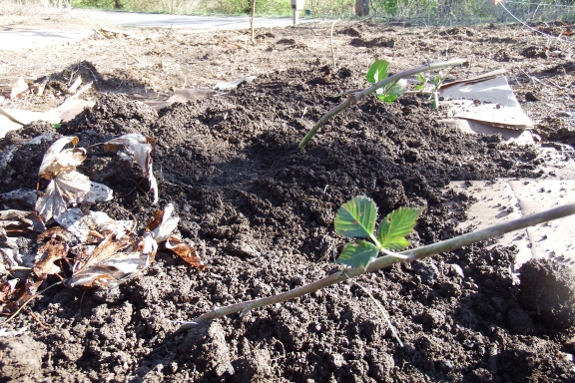
Done! Here's hoping for
big, juicy fruits in summer 2019!
Wiring the DuctlessAire Mini Split indoor unit to the main outdoor unit is easier if you stay within the 20 feet range of the included cable complete with proper wiring terminals that match the hook up points.
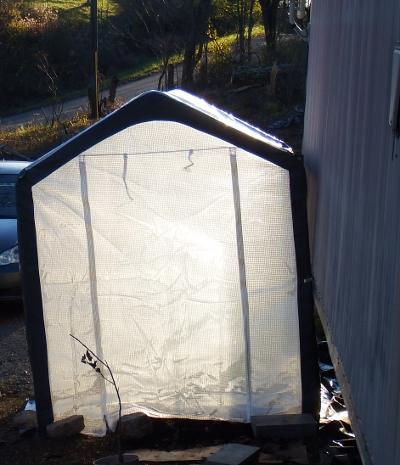 We had several thoughtful
comments about our new
mini-greenhouse.
Let's see if I can answer them all in one post!
We had several thoughtful
comments about our new
mini-greenhouse.
Let's see if I can answer them all in one post!
"I'd
love to know the brand name & what you think of the quality. From
the pic, I'm impressed by what looks like reinforced corners. Or are
they just a different color?" --- Terry
This is a 6 foot by 8
foot Garden Treasures greenhouse that Lowes used to sell for a couple
of hundred bucks. I believe Rose Nell found it on sale for $69, likely
because the model has been discontinued. The plastic is pretty thick
and the corners are reinforced, which is both a pro and a con --- the
material will likely last longer but will also block some light.
Although you can't find
the Garden Treasures greenhouse in the stores any longer, it looks
quite similar to this model on Amazon.
"Got
any idea as to how long that plastic will last before it breaks down in
the sun?" --- Nayan
This is the flaw in any
type of discontinued product like this --- replacement parts are
unavailable. My plan is to try to rig a new covering out of rolled
greenhouse plastic once the original dies. I hope we don't have to
figure out whether that works for several years!
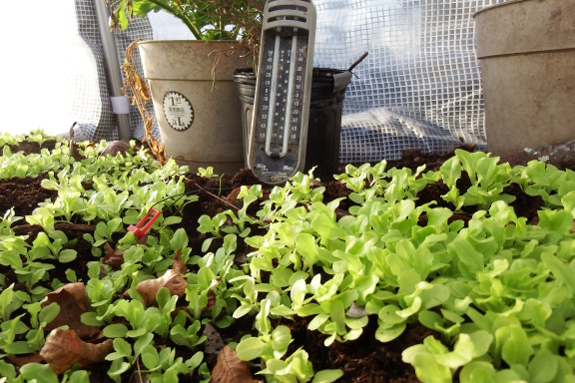
"How
much of a temperature boost will a greenhouse like this give winter
crops?" --- me
So far, on a clear night
after a sunny day, the greenhouse seems to be providing a couple of
degrees sheltering effect. I suspect the longer-term impact will be due
to raising soil temperature during the day and giving winter growers
more oomph, but we'll have to wait and see how that pans out.
I took a photo of the
lettuce in the greenhouse and another bed of lettuce (slightly bigger)
under a simple layer of row-cover fabric and will report back in a
couple of weeks once the two data points have time to diverge. Stay
tuned!
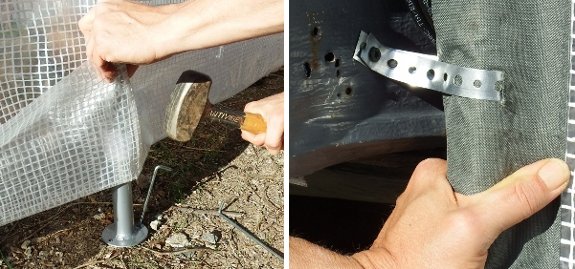
We cut a small slit in the
greenhouse corner fabric to feed some strapping through.
The kit came with some tent
stakes and two holes in each foot for ground securing.
It might help to close the
windows on really windy days.
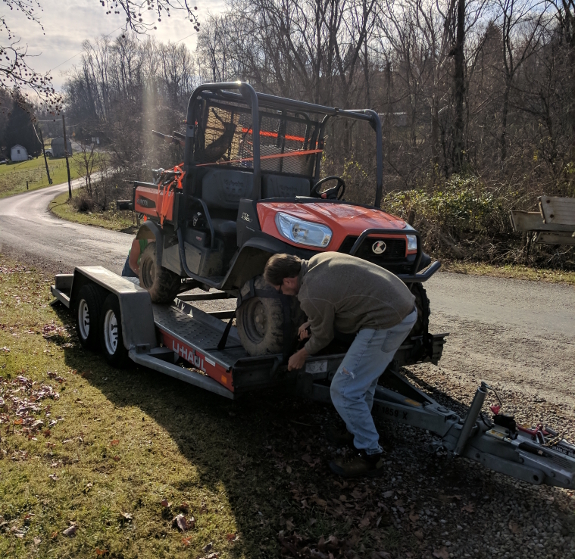
Mark and Rose Nell took
a whirlwind trip down to the
old home place on
Friday and Saturday to pack up supplies that didn't fit during our
initial move.
The real purpose was
bringing the Kubota up to Ohio so we can sell it --- no need for such
high-class equipment in our more accessible core homestead. But I have
to admit, some of the other supplies Mark and Rose Nell fit into this
second load were even more appreciated (by me at least).
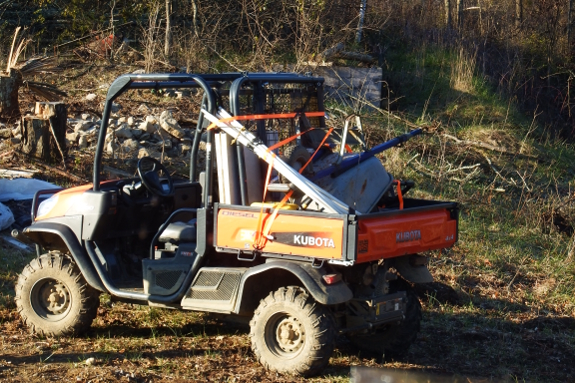
I'm not sure how I lived
for two months without a wheelbarrow, but I'm sure glad to have my
darling back! The quick hoops and ladder are also much appreciated. You
don't realize how much some of these tools are worth until they're gone!
The big obstacle that caused
us to call a certified HVAC tech for our DuctlessAire Mini Split system
was charging the lines with a tank of nitrogen to test them with a
proper gauge before releasing the pre-charged refrigerant from the
outside unit.
A tank for nitrogen would cost
around 100 dollars then you'd have to find somewhere to fill it with
nitrogen and then you would still need to have the proper hose and
fittings to hook up to the service port of the unit.
After calling 5 different
places in our area Anna found a company that would come out and finish
our system.
The tech was very nice and
professional and wrapped it all up in just over 2 hours. I'll save the
rest of the details for my next post.
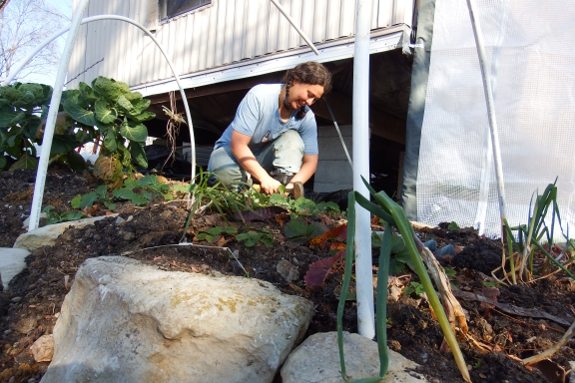
I probably shouldn't
admit to breaking our household rules (no working on the weekends!),
but I got up the morning after Mark's grand
return and
immediately started poking quick hoops into the ground.
After all, due to our
late gardening start, lettuce, kale, and brussels sprouts all looked
like they might not produce this fall. But with a little help from
row-cover fabric, perhaps they'll bear after all?
Our HVAC tech located a kink
in the DuctlessAire Mini Split hose
line he was able to gently fix before all the testing started.
It took about 20 minutes to
vacuum out the hose lines to the accepted value.
He also fixed a wiring
problem where we misjudged the breaker hook up.
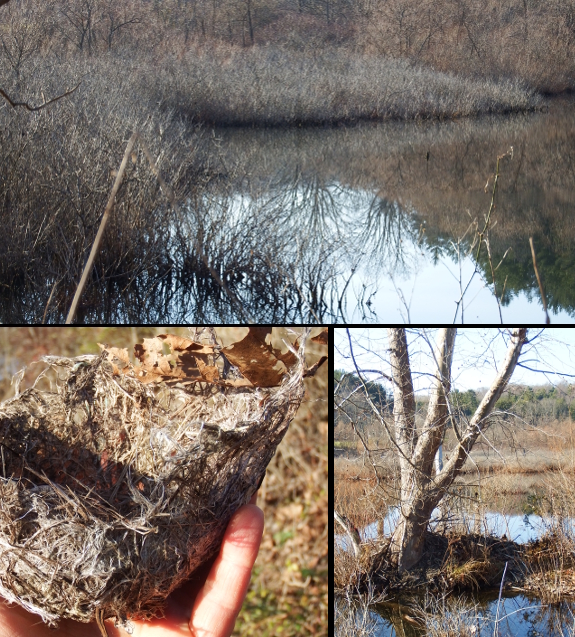
Now that we have the
basics in place --- electricity, heat, a workable kitchen, and running
water --- we've been spending more time exploring what the area has to
offer. One jaunt further afield took us to the Ora E. Anderson Nature
Trail, a half-mile rail-to-trail that passes through an inspiring
wetland.
This area used to be
farmland not too long ago. But the railroad messed with water drainage,
then the beavers moved in and exacerbated the issue. The result is a
species-rich enclave that I'm definitely going to have to return to
during the growing season. A good place to just sit and observe for
awhile!
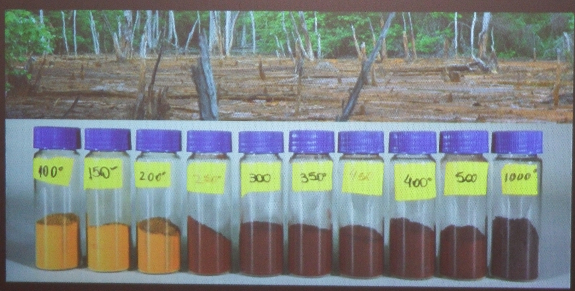
We also attended an
equally inspiring set of lightning talks about partnerships between the
university and the community. The most photogenic involved reclaiming
the orange streams you find throughout coal country, where old mines
leach acidic water and basically kill off all life therein.
In a fascinating method of turning trash to treasure, Rural Action has
created a treatment system that scrubs the issues from the water then
funds itself by selling the pigments to Gamblin Colors to be turned
into oil paints. Sounds pretty sustainable!
Anything inspiring
happen in your neck of the woods this week?
We found a finished board at the Reuse store that makes a good kitchen shelf.
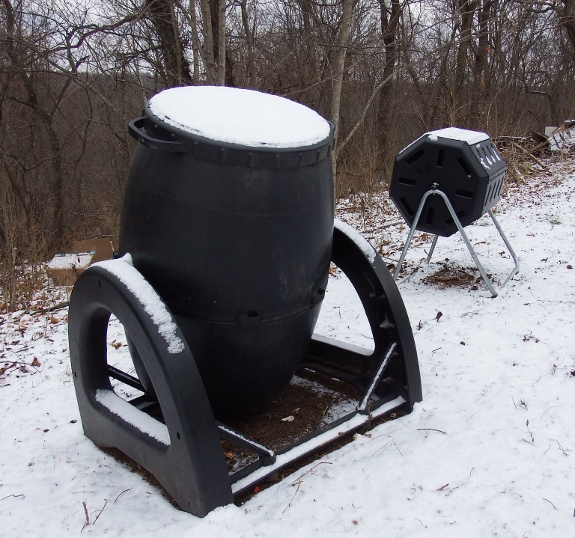
"It
seems everybody here is doing a much better job with these barrel-type
composters than I ever did. Mine would dry out the contents so quickly
it was like a barrel full of dry leaves, which of course never
composted.... What am I doing wrong?" --- Roz
This is an excellent
question! To be honest, I'd never used a tumbler before (although now
we have two of them thanks to the massive unit Rose Nell recently
donated to the cause). I think I might be able to help you troubleshoot
though.
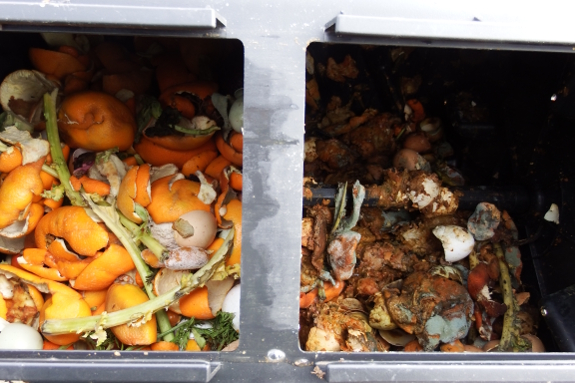
Here's what the older
and younger bins look like inside our original tumbler. This isn't
optimal composting either --- too much high-nitrogen food scraps
("greens") make the contents too moist. In our case, we need to add
some autumn leaves ("browns") to bring the bins into balance.
I'm guessing Roz may
have the opposite problem --- too many browns and too few greens. Maybe
she raises chickens and gives the yummiest bits to the flock. Or maybe
she puts in lots of yard waste or simply eats different types of foods
than we do. Either way, adding in more greens would help bring the bin
back into balance. Chicken manure would be the obvious solution, or you
could try soaking the proto-compost with human urine to add nitrogen and moisture
at the same time.
(Hey, I never said this
post was going to be photogenic. If I grossed you out, go look at the
top photo again. First snow!)
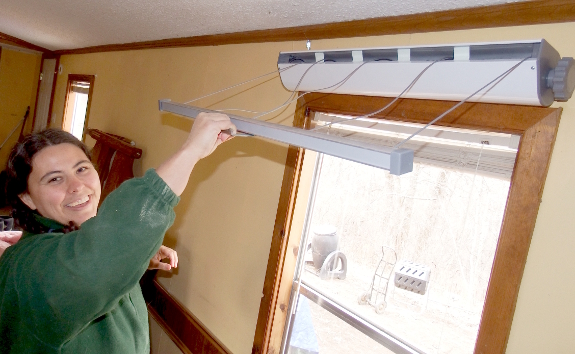
It's heavy duty enough to dry two comforters at once. Then it nearly disappears when not in use.
Eventually, we'll get our outdoor line going. But for now, our indoor unit is more than enough.
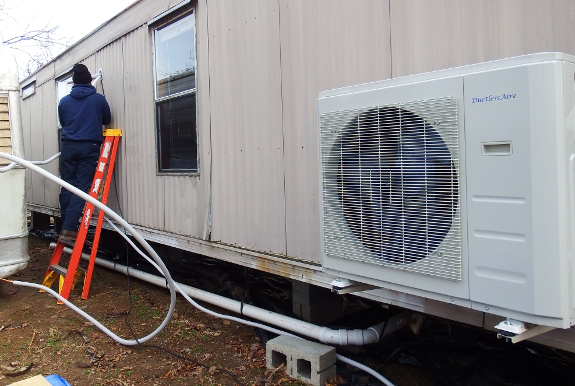
We learned a huge amount
during our recent minisplit install, and I thought I'd try to sum up
the most salient points in one post to help others who might want to
follow in our footsteps.
First --- is a minisplit
a good idea in a trailer? Most installers told us no because the rooms
at the far ends of the mobile home won't receive uniform heat. We're
used to heating with a wood stove, though, and don't mind using space
heaters at the extremities to top off heat as necessary. We figured the
much higher efficiency of a minisplit compared to a mainstream electric
furnace or traditional heat pump counteract this slight downside and we
still feel that way after enjoying our new device for a few blissful
days.
A slightly more tricky
issue is the potential for water lines to freeze. I hadn't realized
that trailers are designed with air-duct heating in mind, so the water
lines run beside the air lines under the trailer. We'll keep you posted
if this issue materializes and requires an outside-the-box fix.
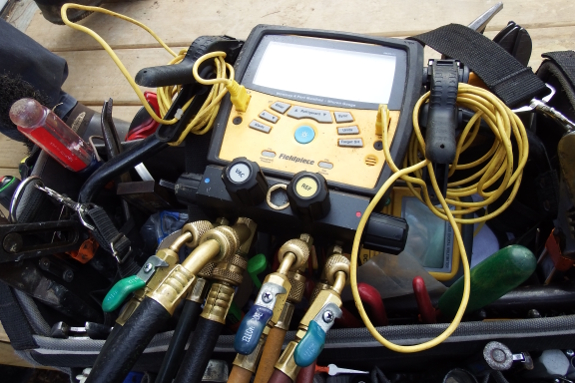
Next, let's look at the
pros and cons of DIY versus the traditional route of paying to have a
minisplit installed by a pro. After calling pretty much every HVAC
company in the area, I've discovered that a minisplit like the one we got for $1,300 from Home
Depot (plus about $200 in tools, $50 for the wall bracket, and $225 for the
final line work from a pro) would have cost us $5,000 to $8,000 if
we'd gone the traditional route. So, yes, we saved big bucks doing a
lot of the work ourselves.
On the downside, we
won't have the support of a licensed dealership behind us if anything
goes wrong. And it's possible our machine won't be as long-lived as the
Mitsubishi models several of the dealerships in the area are peddling.
Once again, we'll cross that bridge when we come to it. For now, I'm
pretty happy with getting such an efficient model on a shoestring
budget.
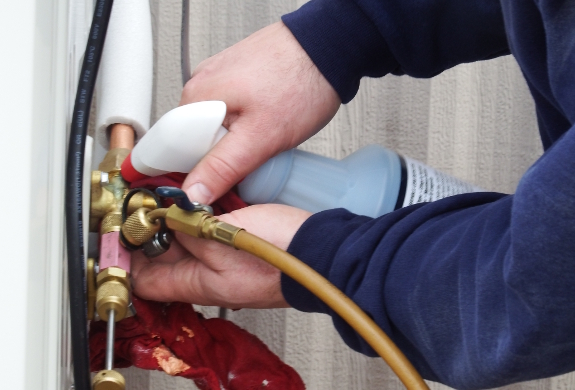
Finally, when do I
recommend calling in a pro? A reasonably handy DIYer should have no
problem installing both exterior
and interior
units themselves. Running the lines between them is actually less
tricky than I'd thought as long as you take extreme care with making
bends gently and slowly.
And the connections
(with pre-flared lines like the ones that came in our kit) are less
finnicky than I'd thought. Mark and I went to great lengths to buy
fancy torque
wrenches and get the tightness just right...but our tech finished
the job with ordinary wrenches by feel. Basically, you just want the
connections to be tight.
So what's it worth
paying for? Go ahead and call in an HVAC expert to test the lines with
nitrogen, pressurize them, then release the refrigerant from inside the
unit. First of all, it's illegal to do this step yourself. Second, this
is the tricky part that most benefits from fancy equipment. For $200, a
pro will do it right...assuming you can find someone in your area
willing to work on equipment not their own.
I found a nice oak section of a desk for 10 dollars at the Reuse store that made a good upper shelf for the new work bench project.
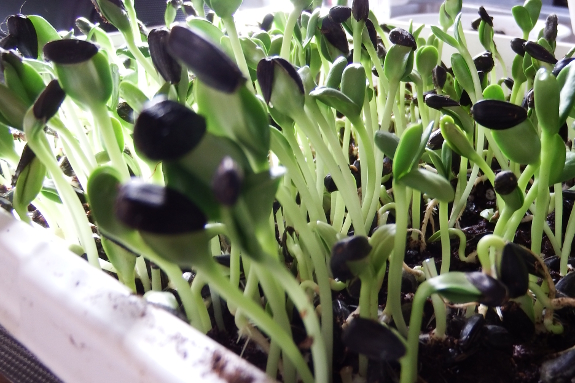
It may be too late in
the year to put in the full fall garden I crave, but there are always
experiments to be undertaken. For example --- growing sunflower
microgreens inside!
A little internet
research suggests that the
tasty tidbits we purchased at the farmer's market are a lot like sprouts...but
not quite. To replicate our experiment, start with raw oilseed
sunflower seeds --- the black kind with no stripes, often intended for
birdseed. Soak a handful for multiple days (changing the water every
twelve hours), then spread the barely sprouted seeds in a seed-starting
flat atop a thin layer of potting soil. Finally, it's just a matter of
waiting for the cotyledons to emerge.
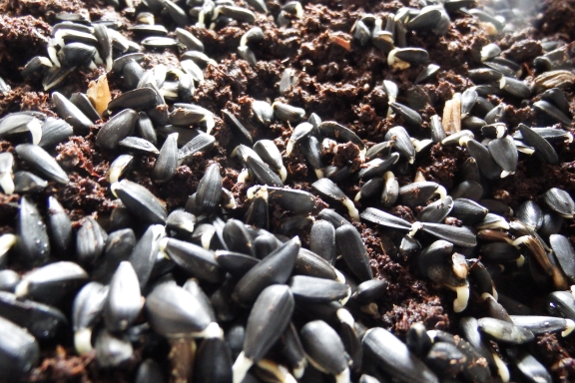
We put our flat on a
heat mat for the first couple of days to hurry things along. After
that, though, I felt like the seeds were getting too hot. So I turned
off the mat and let them linger at room temperature, watering every day
or two but keeping the humidity dome in place most of the time. (I did
tend to air them out once a day, especially when the heat mat was
turned on.)
It took about a week and
a half from first soak to first harvest, and I expect to keep cutting
microgreens at the soil line for up to a week after that. When this
flat is done, the used potting soil and roots will go in the compost
pile --- a bit wasteful, but not terribly bad since the organic matter
will all end up back in the garden.
And then it's time to start soaking seeds for another flat. It sure is
nice to have something fresh and green growing inside while the snow
flies outside our trailer!
(This experiment has been supported by David Hicks. Thanks, David! If anyone wants to join our monthly donor program, you can sign up near the bottom of the page here.)
We considered satellite
internet options when we first got to Athens but decided to go with a
local Wireless Internet Service Provider called Intelliwave. They have an antenna on top of
the local water tower a few minutes down the road from us.
It's been a little over a
month now and we are happy to report that it works as advertised
without any unplanned interruptions.
The speed is only about 2
mbps but fast enough to stream Netflix with no data limit like the satellite options impose.
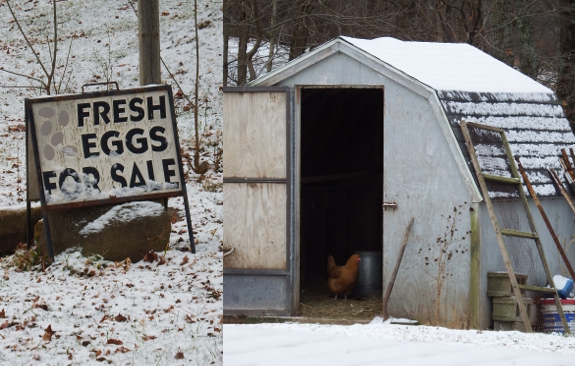
The trouble with growing
so much of our own food for so long is that we've grown extremely
snooty about quality. Which is a problem during this gap year when
we're stuck buying rather than raising our own.
Luckily, a neighbor just
a mile down the road has free range chickens that produce yolks as
orange as the ones I'm used to. She sells her eggs on a sliding scale,
but we didn't ask for a discount and are paying $4 per dozen. (No, the
eggs I bought at the farmer's market previously didn't make my quality
cut. They ranged from $3.50 to $4.50 per dozen.)
The question come spring
will be --- are we ready to fend off predators and get our own flock
back on the ground? Or will we be content with high quality eggs from a
neighbor?
Our DuctlessAire Mini Split ended
up having a little too much hose length.
We chose to work with the
factory flare points instead of cutting the hose and making new flare
points which meant looping up the excess so it can hide behind the unit.
It's been working great at
keeping our trailer warm during some very cold days and nights.
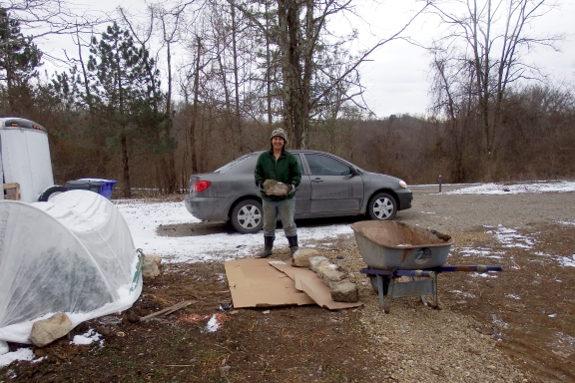
Our new homestead came
with a big pile of rocks and a similarly sized pile of pea gravel. The
former, I suspect, were ripped out of the ground when former owners put
in an ill-fated foundation, and I'm not sure what the latter was
intended for. I immediately claimed both for my garden.
Now that we've had time
to decide which door will be the main entrance (the back one) and what
route we'll take to get to it (a semi-circle curving from parking area
around the corner), I figured it was time to make the path official. I
brought over a bunch of pea gravel for our walkway, then laid down
cardboard lined with rocks and weighed down with topsoil to make a bed along one side.
Once I get another load
of rich earth from our neighbor, I'll fill in the opposite side as
well. I'm thinking this approach to the trailer will be deer-proof red
raspberries for nibbling on our short walk home.
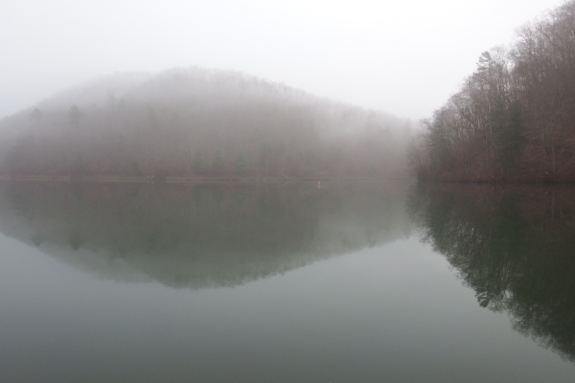
For my birthday, I
headed back to my roots --- home to Bristol to visit family, friends,
and parks new and old. There's far too much to include in one post, so
I'll just hit the highlights here.
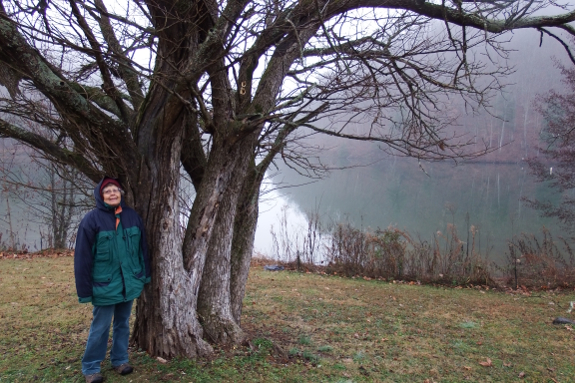
Our favorite mulberry
tree at Steele Creek is showing her age, with ailing limbs and lots of
woodpecker damage. In another couple of decades, there may be no tasty
treats for children and geese to fight over.
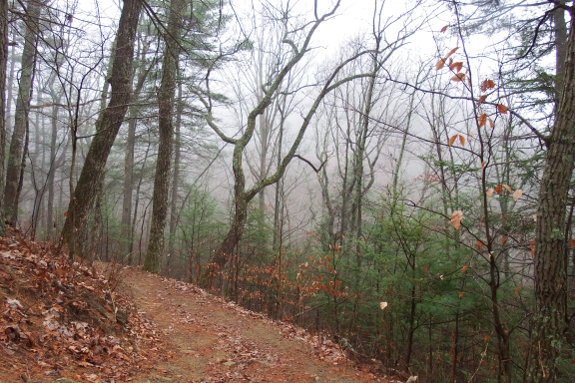
On the other hand, there
are plenty of new attractions, like this trail winding up the side of a
hill that previously saw only off-trail traffic.
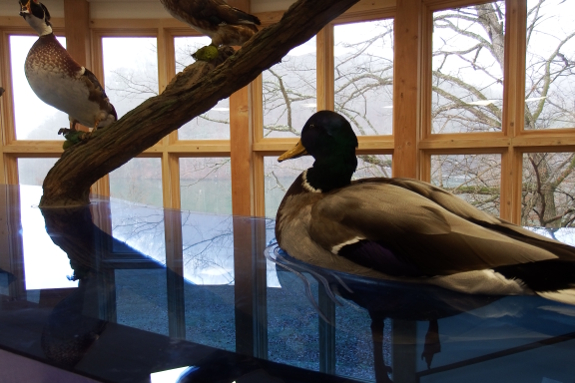
Plus a brand new
addition to the nature center, full of highly impressive and
educational exhibits. If you live nearby and haven't been, put it on
your list!
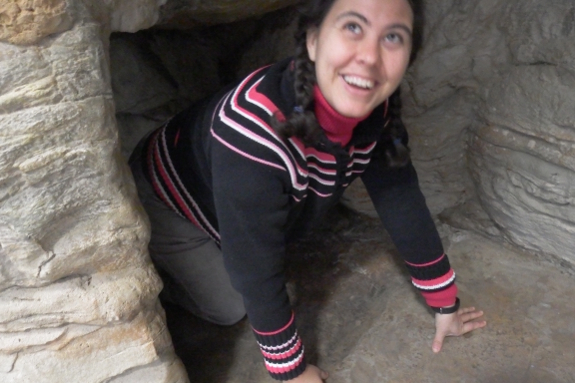
There's even a
crawl-through cave that puts the one at Bays Mountain to shame. Okay,
so Steele Creek's isn't as big...but this one feels like a real cave
inside, complete with fossils and rock formations. An imagination
builder, no doubt.
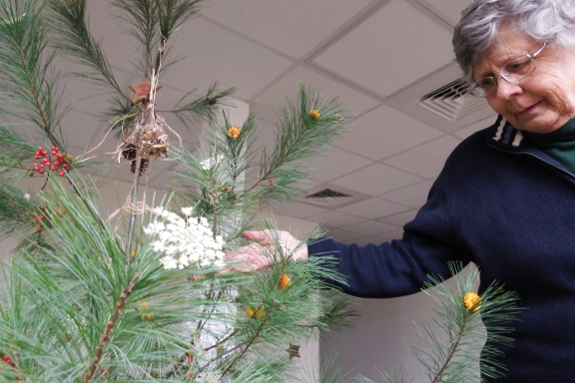
And how could I miss the
natural Christmas tree, decorated with dried flowers, berries, and bird
nests collected throughout the year at the park?
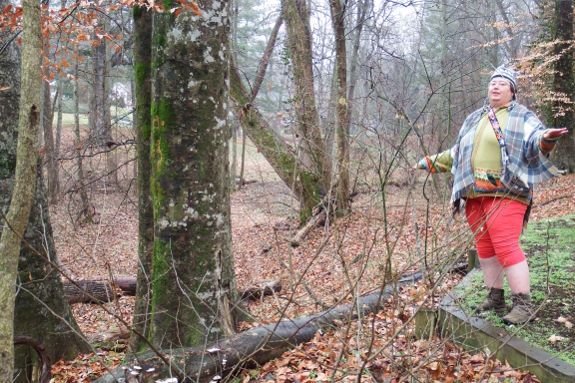
Next stop was the King
University (no longer King College) woods, full of old trees I never
noticed while illegally sledding down their hills as a child.
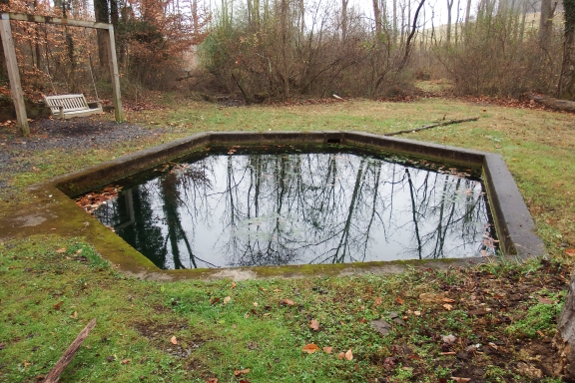
This pond gave me ideas
--- I loved the way straight, concrete lines could look so nice amid
nature. Maybe I could save my pennies and get a concrete truck to come
create one of these to harvest roof runoff for the Ohio garden? Some
day!
There was also a lot of
delectable ice cream, an adorable two-year-old who will actually be
able to have her name and face on the blog in four weeks time if all
goes well, and plenty of board games. What more could I ask for from a
philopatric holiday?
We've been using the new
Google VOIP device for a
little over a month now and happy to report the quality is the same as
most land line phones. There was once when the connection was bad but
it may have been due to the cell phone I was talking to. Once I hung up
and re-connected the problem went away.
It's very easy to hook up. An
ethernet cable plugs into the back and then into the internet router.
Plug the phone cable from the box to any phone and it is ready to go.
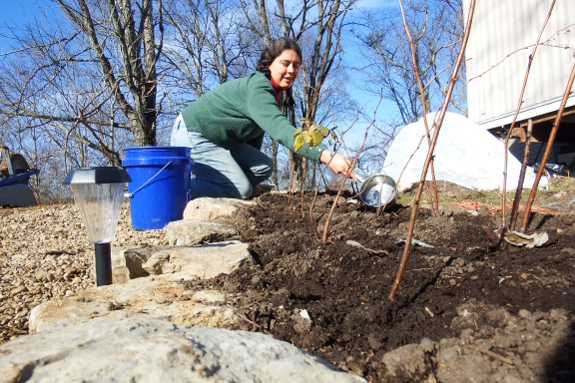
Mom's birthday present
promises to feed me far more than twice. Digging up raspberries in her
back yard that began life in my own Virginia yard will remain a fond
memory always, while setting the brambles out when I got home helped
root me back in my new digs. And, of course, we should be eating those
fruits for many years to come...starting in 2018 since Mom provided
such big starts. Thank you so much for the perfect gift!
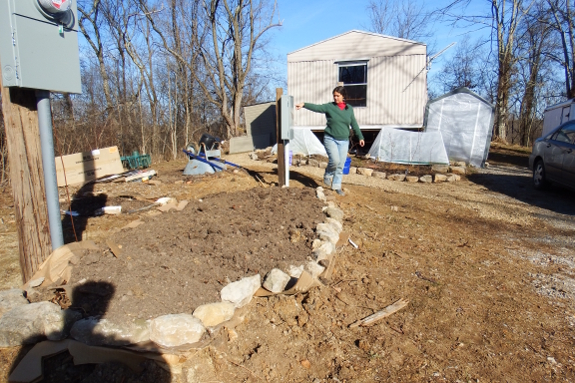
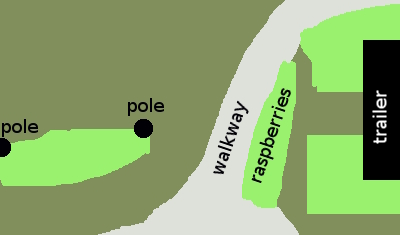 In case you're curious,
here's a long shot of our close-to-home garden patches. We're
considering moving the beds that are currently covered with quick hoops
to leave that area clear for rainwater catchment, and we might put a
grape trellis between the two power poles. But it's all still up in the
air until plants go in the ground. At the moment, I'm enjoying taking
time to dream.
In case you're curious,
here's a long shot of our close-to-home garden patches. We're
considering moving the beds that are currently covered with quick hoops
to leave that area clear for rainwater catchment, and we might put a
grape trellis between the two power poles. But it's all still up in the
air until plants go in the ground. At the moment, I'm enjoying taking
time to dream.
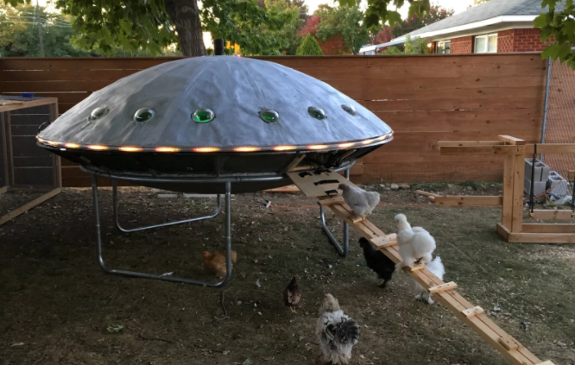
Backyard Chickens has a new
chicken coop write up that is out of this World!
Some clever Artistic urban
chicken keepers created this
Cosmic Chicken Coop masterpiece from two 10 foot satellite dishes
they found on Craigslist. A trampoline frame holds it all up.
Maybe if the frame was
painted a similar color as the ground it might look like it's floating
under certain lighting conditions.
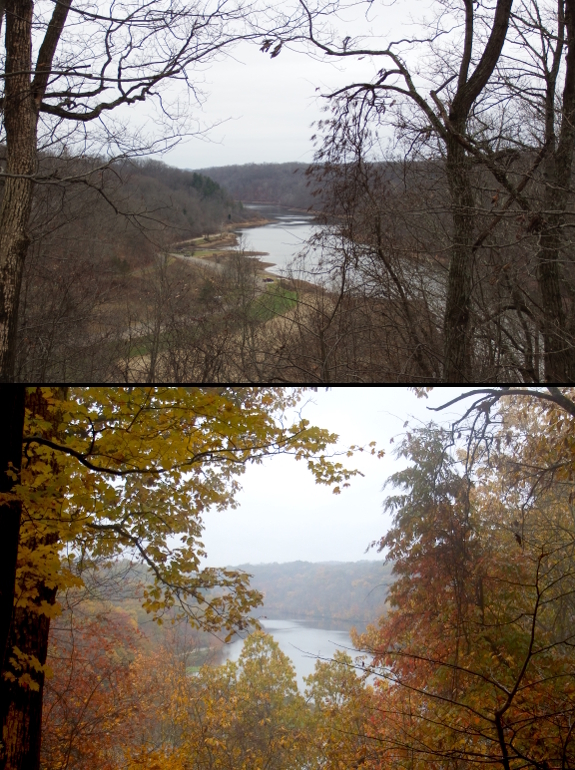
It's hard to believe
we've already been here for an entire season, but the view from Vista
Point doesn't lie. I
walk the trails now without a map and we know our neighbors on one
side. (I'll be using the bearing-cookies-open-the-door technique for
the others in the New Year. Feel free to comment with flavor
suggestions if the grapevine has preceded us and you read our blog.)
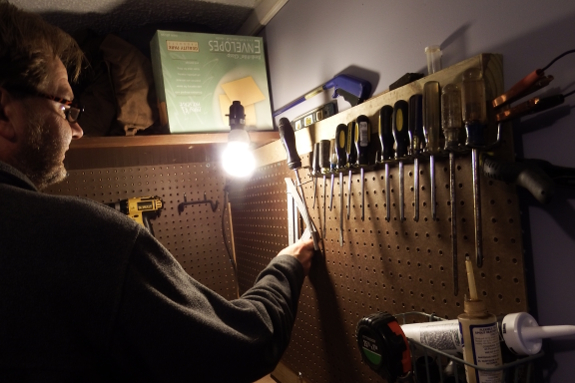
We've unpacked the
kitchen and other bare necessities but are being a bit slow in other
rooms. Let's be honest --- most of us probably only use 50% of our
stuff a few times a year. We did slough off obviously unnecessary
possessions while packing, but clearly we still have more than we
really need.
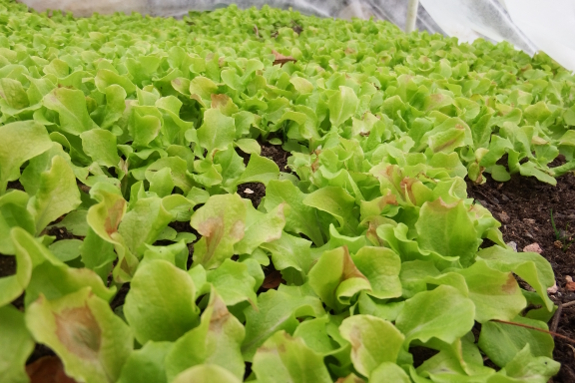
Meanwhile, in the
garden, we've harvested one bowl of lettuce from under the quick hoops
and may or may not get more before the really cold weather hits. I've
already learned that the key to enjoying outdoor activities during an
Ohio winter is a wind breaker, and our pipes froze up once due to lack
of heat tape in a key exposed point.
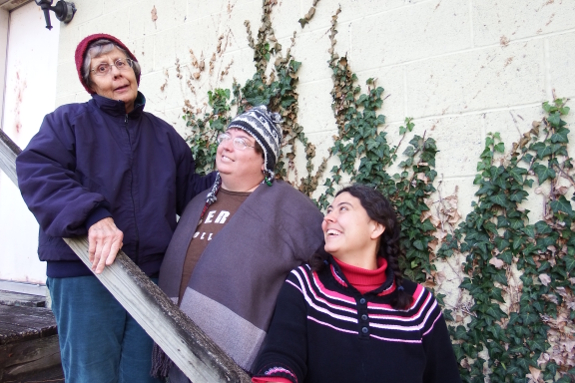
What will our lives look like
in one more season? It's hard to imagine when three short months has
already taken us this far!
Happy solstice, merry
Christmas, and jolly major winter holiday of your choice!
On our recent trip to Bristol
we visited a cemetery with the oldest man in the world.
Si Goodson was reported to be
132 when he died. That would be 10 years more than the oldest verified
person on record which is Jeanne Calment who lived to the age of 122
years and 164 days.

Mark and I took a quick
Christmas Eve jaunt over to Xenia to visit Rose Nell and Jayne. Between
crab legs and gabbing we found time to drop by the Dayton Art Institute.

I'd planned to spend my
time in the Native American exhibit, but we ended up being far more
impressed by the contemporary art room.
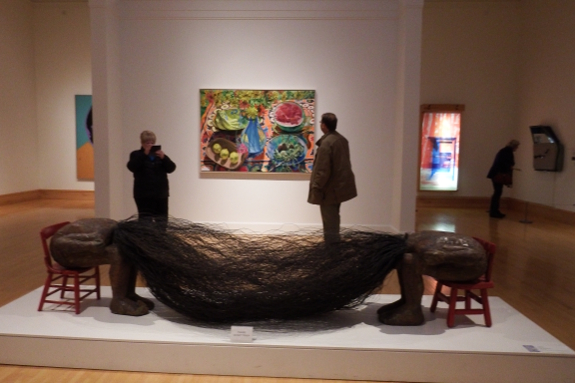
This sculpture, in
particular, sucked in all three of us women (although Mark seemed
largely oblivious to its power). I couldn't decide whether Alison
Saar's evocative piece was showcasing the angst of a curly haired woman
trying to brush out tangled hair or whether it was a mother and
daughter screaming at each other the way only female kin can. Either
way, my photo doesn't do the piece justice. If you're in the area, I
highly recommend you go and look for yourself!
 With cold weather setting in
with a vengeance and an influx of cash from selling the Kubota, we
decided it was finally time to make a decision on what kind of skirting
to use. There are three main options, ranging in price from moderately
expensive to really expensive --- vinyl, metal, and Reil rock (the last
being plastic panels that are made to look like stone).
With cold weather setting in
with a vengeance and an influx of cash from selling the Kubota, we
decided it was finally time to make a decision on what kind of skirting
to use. There are three main options, ranging in price from moderately
expensive to really expensive --- vinyl, metal, and Reil rock (the last
being plastic panels that are made to look like stone).
Vinyl, while cheap,
comes with serious downsides. Foremost is fragility --- even a good
whack with a weedeater will cut through this thin barrier in no time.
Since I tend to be rough on my surroundings, I regretfully decided to
give vinyl a pass despite the lowest price tag of the bunch --- about
$600 for a kit to enclose a 14x70 singlewide.
Metal is much more
resilient for only a few extra dollars, with the downside that you have
to build a frame out of lumber rather than relying on a kit's built-in
rails. Reil rock is quite a bit more pricey --- $1,300 for 14x70
singlewide, with lumber and any insulation added on top.
What did we choose? We
opted to think outside the box and make our own metal skirting out of
painted roofing metal, 1-inch rigid insulation panels, and treated
lumber. Cost of the basic supplies came to about $1,300 delivered
before Mark's veteran's discount. I suspect the project will be closer
to $1,500 once we add on four vents, screws, plus sufficient hardware
to create a pair of access doors. But hopefully the finished product
will protect our pipes!
It got down to 4 degrees here
this morning.
The DuctlessAire Mini Split is
struggling with the cold but still delivering heat.
It goes into defrost mode more during extreme days.
On a cold day like today it
seems to only be able to heat our living area space to the low 60's,
which is acceptable for us. If we had the wood stove installed we
would've built a fire if we wanted things more toasty.
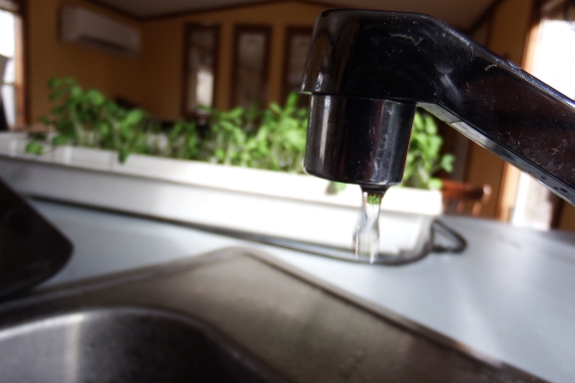
Even though we ordered
our skirting supplies two weeks ago,
they're not going to arrive until early next week. So we entered the
current cold spell with insulation under our trailer but no skirting in
place.
The solution? The good
old faucet drip. Unfortunately, we didn't think to drip both hot and
cold on the first night, so the hot-water line froze up when external
temperatures got down to 9 degrees. I hope when that line thaws, we
don't see a mess.
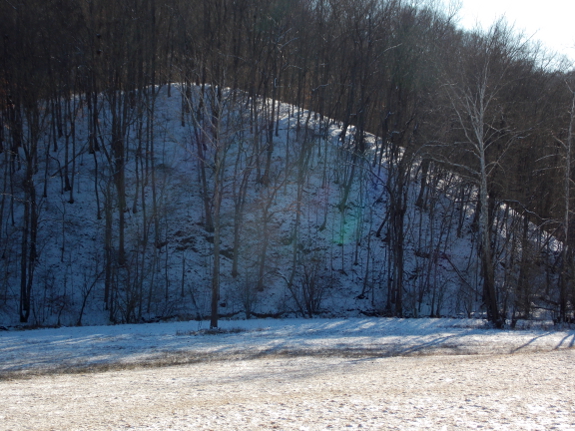
In the meantime, we're
keeping our cold water running, hoping the drip will be enough to get
us through until the weather breaks enough for us to close the
underside of the trailer in. The simplicity of our old water system ---
entering the trailer at only one point with a big tank we could resort
to hauling buckets from if all else failed --- looks pretty good at a
time like this. Of course, even that system broke down at -10. I hope we don't get to
compare similar temperatures here in the week to come....
We got the General
IRT207 mid range infrared thermometer to pin point a frozen pipe.
We also learned the hard way
not to let the water drip overnight with a cold septic system. It
froze the drain pipe.
Want more in-depth information? Browse through our books.
Or explore more posts by date or by subject.
About us: Anna Hess and Mark Hamilton spent over a decade living self-sufficiently in the mountains of Virginia before moving north to start over from scratch in the foothills of Ohio. They've experimented with permaculture, no-till gardening, trailersteading, home-based microbusinesses and much more, writing about their adventures in both blogs and books.
